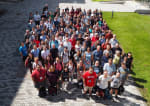Well, there it is, the first plane to arrive at the South Pole for the season—a Basler. It only stopped long enough to refuel, but that was plenty of time to unload its precious cargo of fresh fruit. […]
New measurements of cosmic ray spectra and composition from IceCube and IceTop
In a paper recently published in Physical Review D, the IceCube Collaboration reports on measurements of the all-particle cosmic ray energy spectrum and composition in the PeV to EeV energy range using three years of data from the IceCube Neutrino Observatory. […]
IceCube and PICO set new constraints on properties of dark matter particles
Dark matter is one of the biggest mysteries in modern astronomy and physics. In a paper recently submitted to the European Physical Journal C, scientists from IceCube and PICO determined new constraints on particle physics properties of dark matter. Though these are less stringent than previous constraints, they take into consideration the latest research on the distribution of dark matter in our galaxy. […]
New all-sky search reveals potential neutrino sources
After 10 years of searching for origins of astrophysical neutrinos, a new all-sky search provides the most sensitive probe of time-integrated neutrino emission of point-like sources. The IceCube Collaboration presents the results of this scan in a paper submitted today to Physical Review Letters. […]
Week 40 at the Pole
The sun is well above the horizon, so there’s plenty of light for outdoor photography. And IceCube’s winterovers got right out there to take some splashy photos—that actually involved a splash of sorts, by throwing water out into an arc overhead that quickly turned into a spray of ice crystals. […]
Week 39 at the Pole
The sunrise is over now at the South Pole, with the sun fully risen. But if you position yourself just so, near a large snowdrift, it can almost appear as though the sun is rising right there. […]
Week 38 at the Pole
It’s time for sunglasses now at the South Pole—the sun has definitely made its presence clear. And it’s here to stay, or rather for a good long while anyway. […]
Week 37 at the Pole
Some weeks at the Pole are quiet, and some—like last week—are busy. The IceCube detector had a number of hiccups that required the winterovers’ attention. On top of taking care of IceCube, there were plenty of other things to attend to as far as getting the station ready for the summer crews. […]
Japan hosts collaboration meeting for first time
The fall IceCube Collaboration meeting wrapped up last Friday in Chiba, Japan. About two thirds of the collaboration, representing 38 institutions in 11 countries, assembled at Chiba University, the home institution of the International Center for Hadron Astrophysics (ICEHAP) group, from September 16–20. […]
Week 36 at the Pole
The sky just gets brighter and brighter along the horizon. And although auroras are exciting, the dawn sky with its changing colors holds its own special appeal. […]









